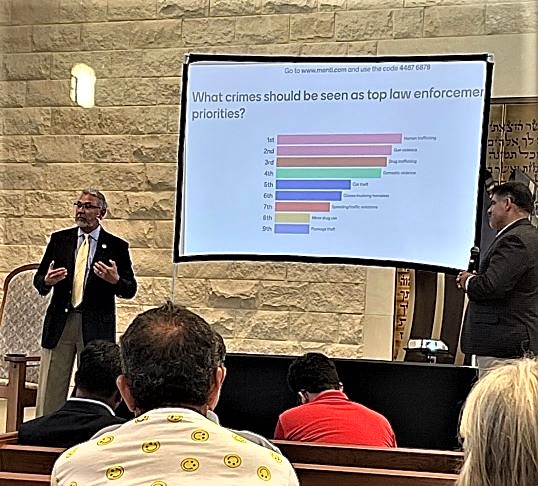If anyone doubts that human trafficking is a problem, the events of the last couple weeks here in south Texas should disabuse them of the notion.
By now we know of the fifty-three migrants who lost their lives in a boiling 18-wheeler here in San Antonio. A few days later, there was a fatal crash in “an attempted human smuggling” operation just this side of Laredo.
Apparently, it seems like citizens are more in touch with this issue than local authorities.
The week prior to the tragedies, I attended a “Crime on the Northside” townhall at a local synagogue with my locally-focused, non-partisan group InfuseSA. It featured two San Antonio City Councilmen, the chief of police, and the Bexar County District Attorney.
In addition to the DA’s routine, misguided scapegoating of the “pandemic” for the problems of the last couple years, the crowd of a hundred-plus also grumbled when he expressed surprise that the number one criminal concern amongst them was “human trafficking.”
“We don’t have a high number of human trafficking cases that have been filed in our office.”
As if following from the same script, the local mainstream media reported that “crimes of concern among attendees … seemed to be break-ins, or burglaries.” Attributing one of our Infusiasts’ jaw-drop reaction to merely a “statement made by” the DA highlighted the disconnect.
Hopefully this attitude changes. In the meantime, there are some obstacles to overcome.
Our police chief offered a take that he’s expressed before, that “leading a high-risk lifestyle, including drug use or prostitution, puts people at risk of violent crimes.”
Though he reaffirmed to me in a follow-up phone call that he (wisely) tries to stay out of politics, it does come into play here. A reconciliation between the predominant political approaches is in order.
After taking a step forward a few years ago, the Texas GOP backtracked at their convention recently when they included opposition to marijuana decriminalization in their platform. Our DA, a democrat, is to be commended for going in the other direction, de-prioritizing the prosecution of such activities that involve voluntary and/or consenting parties.
Such acts do not however, include theft, vandalism or the like. Blatant aggressions by one party against another deserve a night or more in the pokey, depending on the severity of the violation.
Properly differentiating between real crimes and fake crimes is the duty of elected representatives. The latter distract law enforcement from the former, needlessly increasing their workload. Unfortunately, politicians are too busy creating magnets for more.
San Antonio Mayor Ron Nirenberg, while lamenting the smuggling tragedy on our southwest side, noted how we “depend on migrant labor in the midst of a labor shortage.”
However, if that’s worth mentioning here, why are he and city council discouraging San Antonians from filling the gap?
They call it “emergency funding” for “wraparound services” for enrollees in their “Ready to Work” program. But when you increase handouts to people, you lessen their incentive to search for work.
Moreover, when you target “undocumented immigrants” as a beneficiary of a recently-passed “affordable housing” bond, you enhance the appeal of their trek here, even if it means risking their own lives.
All this gives the impression that the city would rather see foreigners plug employment holes while they sideline San Antonians by coddling them along the way. It’s counterproductive at best, condescending at worst.
As the mayor indicated, immigration is largely a federal responsibility. But that doesn’t mean their actions, like convincing voters to approve such initiatives, are not susceptible to the laws of nature and economics.
States and municipalities that conduct business in such a way can’t totally wash their hands of problems like this.
===
Christopher E. Baecker teaches economics at Northwest Vista College, is the editor and policy director at InfuseSA, and is a board member for the Institute for Objective Policy Assessment. He can be reached via email or Facebook.

